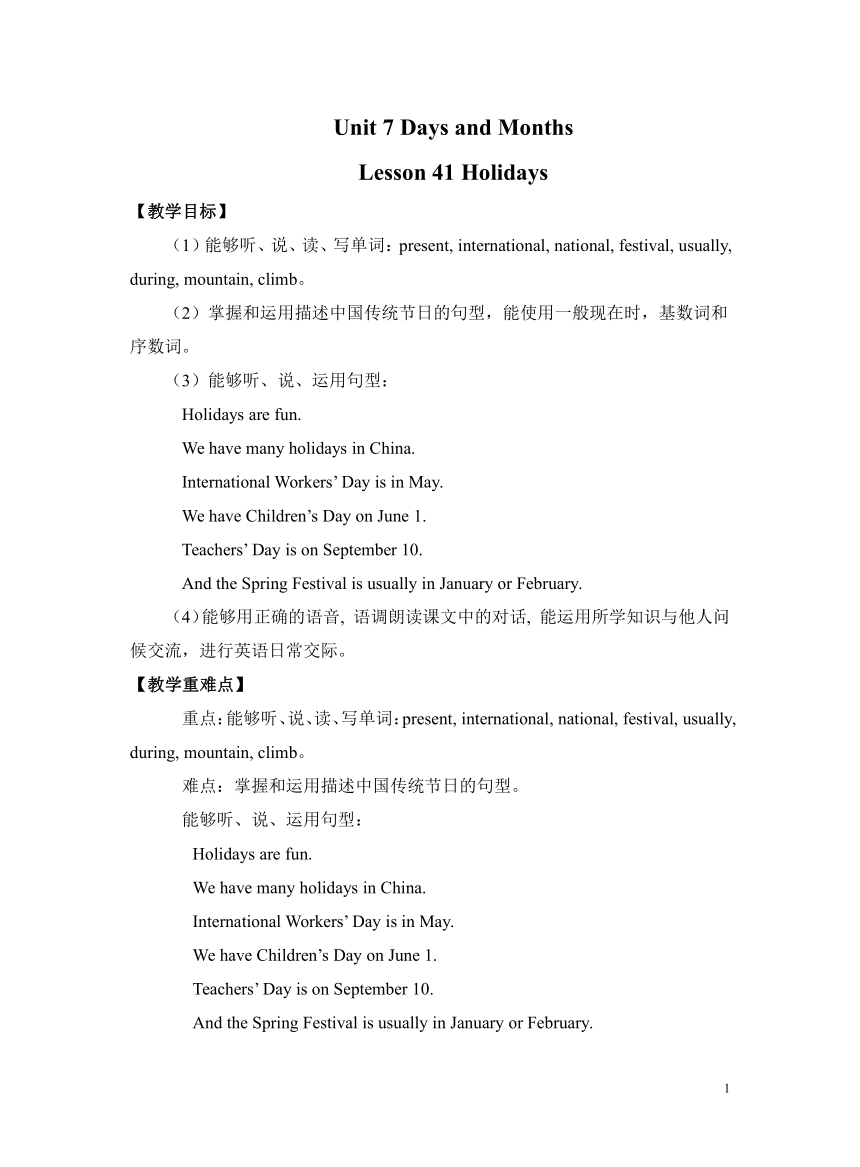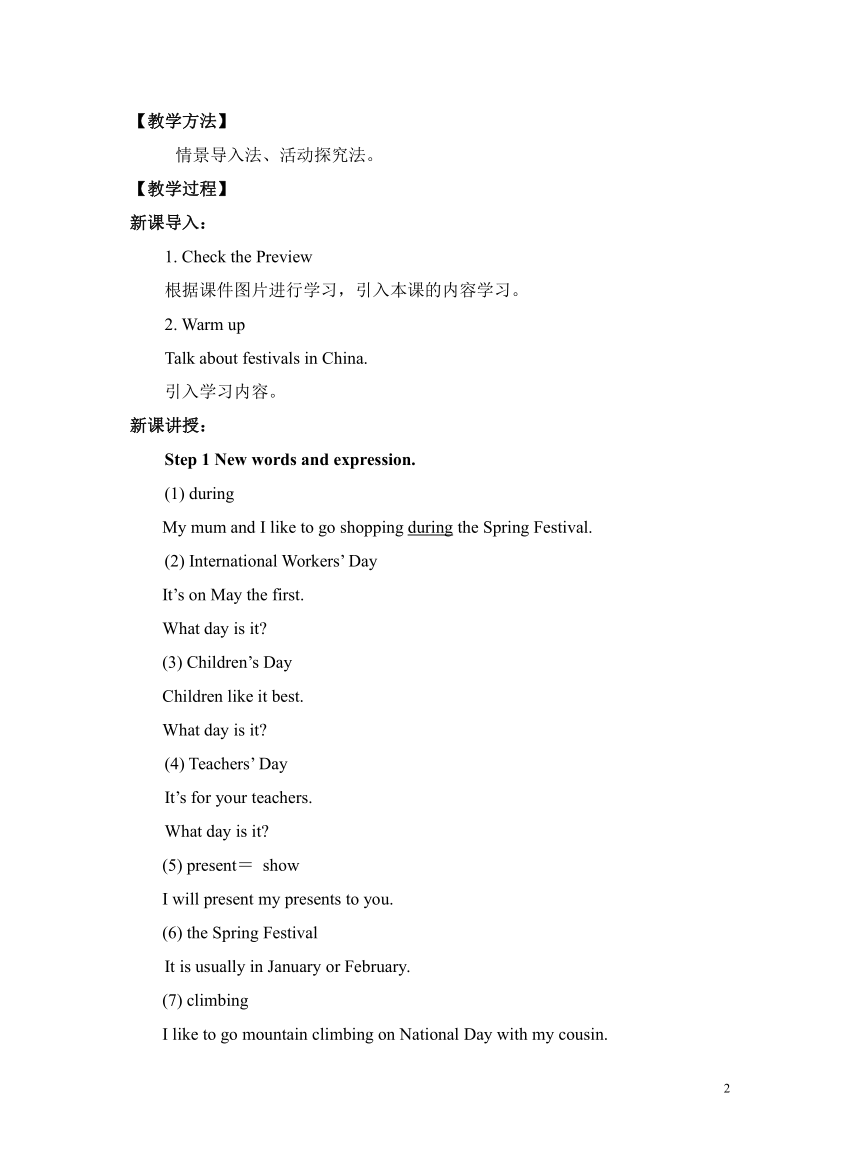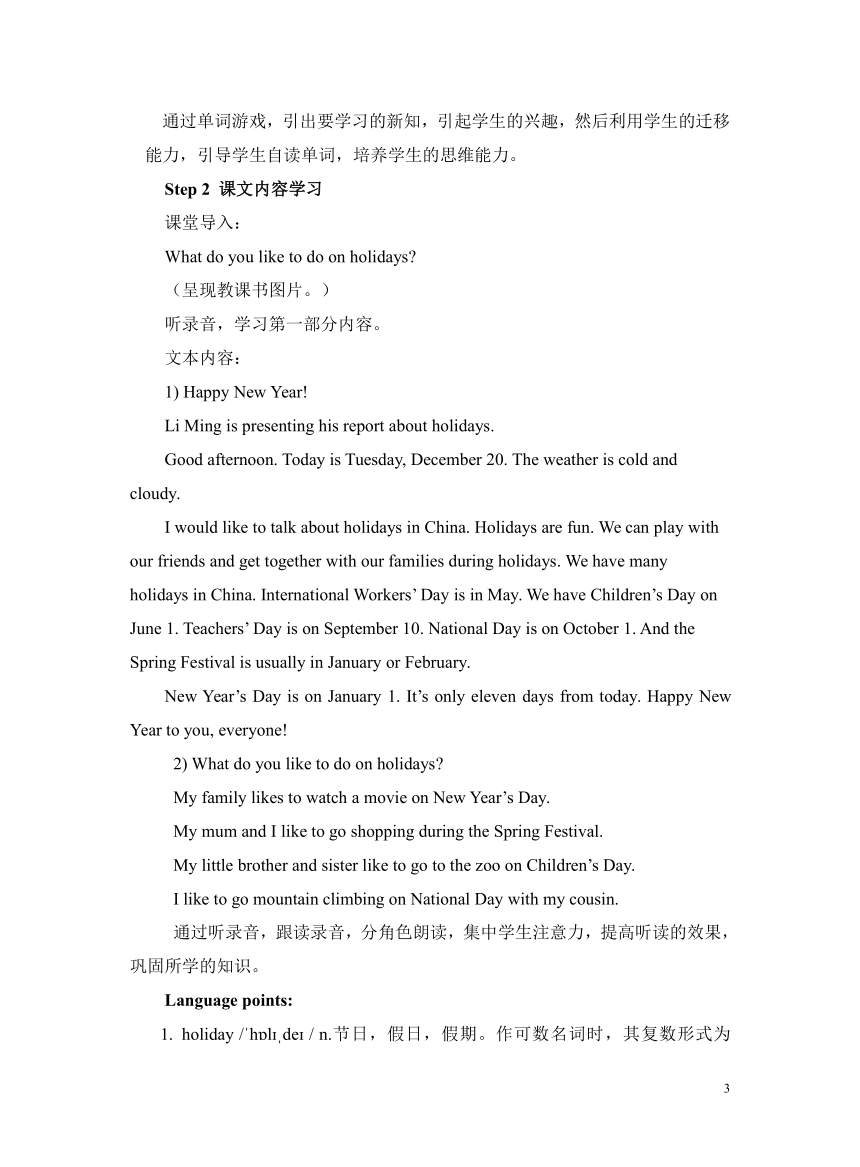冀教版英语七上Unit 7 Days and Months Lesson 41 Holidays 教案
文档属性
| 名称 | 冀教版英语七上Unit 7 Days and Months Lesson 41 Holidays 教案 |

|
|
| 格式 | docx | ||
| 文件大小 | 25.7KB | ||
| 资源类型 | 教案 | ||
| 版本资源 | 冀教版 | ||
| 科目 | 英语 | ||
| 更新时间 | 2023-09-06 21:43:36 | ||
图片预览



文档简介
Unit 7 Days and Months
Lesson 41 Holidays
【教学目标】
(1)能够听、说、读、写单词:present, international, national, festival, usually, during, mountain, climb。
(2)掌握和运用描述中国传统节日的句型,能使用一般现在时,基数词和序数词。
(3)能够听、说、运用句型:
Holidays are fun.
We have many holidays in China.
International Workers’ Day is in May.
We have Children’s Day on June 1.
Teachers’ Day is on September 10.
And the Spring Festival is usually in January or February.
(4)能够用正确的语音, 语调朗读课文中的对话, 能运用所学知识与他人问候交流,进行英语日常交际。
【教学重难点】
重点:能够听、说、读、写单词:present, international, national, festival, usually, during, mountain, climb。
难点:掌握和运用描述中国传统节日的句型。
能够听、说、运用句型:
Holidays are fun.
We have many holidays in China.
International Workers’ Day is in May.
We have Children’s Day on June 1.
Teachers’ Day is on September 10.
And the Spring Festival is usually in January or February.
【教学方法】
情景导入法、活动探究法。
【教学过程】
新课导入:
1. Check the Preview
根据课件图片进行学习,引入本课的内容学习。
2. Warm up
Talk about festivals in China.
引入学习内容。
新课讲授:
Step 1 New words and expression.
(1) during
My mum and I like to go shopping during the Spring Festival.
(2) International Workers’ Day
It’s on May the first.
What day is it
(3) Children’s Day
Children like it best.
What day is it
(4) Teachers’ Day
It’s for your teachers.
What day is it
(5) present= show
I will present my presents to you.
(6) the Spring Festival
It is usually in January or February.
(7) climbing
I like to go mountain climbing on National Day with my cousin.
通过单词游戏,引出要学习的新知,引起学生的兴趣,然后利用学生的迁移能力,引导学生自读单词,培养学生的思维能力。
Step 2 课文内容学习
课堂导入:
What do you like to do on holidays
(呈现教课书图片。)
听录音,学习第一部分内容。
文本内容:
1) Happy New Year!
Li Ming is presenting his report about holidays.
Good afternoon. Today is Tuesday, December 20. The weather is cold and cloudy.
I would like to talk about holidays in China. Holidays are fun. We can play with our friends and get together with our families during holidays. We have many holidays in China. International Workers’ Day is in May. We have Children’s Day on June 1. Teachers’ Day is on September 10. National Day is on October 1. And the Spring Festival is usually in January or February.
New Year’s Day is on January 1. It’s only eleven days from today. Happy New Year to you, everyone!
2) What do you like to do on holidays
My family likes to watch a movie on New Year’s Day.
My mum and I like to go shopping during the Spring Festival.
My little brother and sister like to go to the zoo on Children’s Day.
I like to go mountain climbing on National Day with my cousin.
通过听录音,跟读录音,分角色朗读,集中学生注意力,提高听读的效果,巩固所学的知识。
Language points:
holiday / h l de / n.节日,假日,假期。作可数名词时,其复数形式为holidays。
与其相关的常用词组有:on holidays度假;summer/winter holidays暑/寒假。
辨析holiday,festival和day.
易混单词 用法辨析 例句
holiday “假日,休息日”,主要指按法律和风俗习惯而停止工作的节假日。 Today is June 30. Summer holidays are coming. 今天是6月30号。暑假就要来了。
festival 指人们在一起庆祝的具有传统或历史意义的节日。 When is the Spring Festival 春节在什么时候
day 指为特定人群设定的节日。 Women’s Day is on March 8.妇女节在3月8号。
2. “We have … on …”是表达在某天有某个节日或活动的句式。
e.g. We have Sports Day at our school on March 11.
在三月十一号,我们在学校开运动会。
We have Teachers’ Day on September 10.
我们的教师节在九月十号。
3. 表示节日的专有名词的每个单词的第一个字母都要大写。表示节日的专有名词前一般不带定冠词the。表示在某个节日时常用介词on。
e.g. Teachers’ Day教师节
Children’s Day 儿童节
Women’s Day妇女节
Father’s Day父亲节
4. What do you like to do on holidays
What do/does+主语+like to do ”是询问“某人喜欢做什么 ”的常用句型。
e.g. —What do you like to do on Sunday
你喜欢在周日干什么
—I like to go shopping. 我喜欢去购物。
5. in /in/, on / n/, at / t/ prep. 在
in, on, at都可以加表示时间的词,区别如下:
in 常用于年、月或季节之前,还可泛指“在上午/下午/晚上”等 in May在五月 in 2012 在2012年 in winter在冬季 in the morning在上午
on 常用于年月日、星期或具体某一天的早晨/下午/晚上 on Monday在星期一 on July 1, 2012 在2012年7月1日 on the morning of May 1st在五月1日的早晨 on a rainy evening 在一个下雨的晚上
at 常用来表示某个时间点,即“在几点(几分)” at four o’clock 在4点钟 at half past two 在2点半
Step 3 Let’s Do It!
1. Match the Chinese holidays with the dates or months.
2. Listen and fill in the blanks with the phrases in the box.
3. Read the passage. Circle the dates and underline the activities. Then write the holidays in order of their dates (starting with January).
4. Work in pairs. What do you like to do during the holidays Make up a dialogue.
课堂练习:
一、根据句意及首字母提示完成句子
1. —Which is your favourite f
—Christmas Day.
2. Do you like c mountains
3. I like to play with my cousins d the Spring Festival.
4. N Day is on October 1st.
5. January 1 is New Y Day.
二、用所给单词的适当形式填空
1. —Would you like ________(watch) a movie with me on Sunday
—Yes, I’d love to.
2. Ms. Li, our English teacher, is making some ________(present) for us now.
3. —Do you like ________ (play) basketball
—Yes, I do.
三、单项选择
1. I would like ________ meals for my parents on Mother’s Day.
A. cook B. cooking C. to cook D. cooks
2. Jim likes reading. He ________ stays in the library.
A. sometimes B. never C. once D. usually
3. Tim is going to give his father a surprise ________ Father’s Day.
A. in B. at C. on D. By
课堂小结:
T: What did you learn about this lesson
学生自由说,教师总结。
语言知识:
1) 识记以下单词: present, international, national, festival, usually, during, mountain, climb。
2) 掌握短语及句型:
Holidays are fun.
We have many holidays in China.
International Workers’ Day is in May.
We have Children’s Day on June 1.
Teachers’ Day is on September 10.
And the Spring Festival is usually in January or February.
1)能运用所学知识与他人问候交流。
2)听懂并能进行英语日常交际。
将本节课所学的知识进行归纳,帮助学生理解和记忆,巩固提升本课时所学的知识。
作业布置:
完成配套课后练习。
【板书设计】
Unit 7 Days and Months
Lesson 41 Holidays
present, international, national, festival, usually, during, mountain, climb
重点句式:Holidays are fun.
We have many holidays in China.
International Workers’ Day is in May.
We have Children’s Day on June 1.
Teachers’ Day is on September 10.
And the Spring Festival is usually in January or February.
【课后反思】
本课时的教学内容是冀教版七年级上册英语第七单元的第五课时, 重点在于如何描述中国的传统节日, 从“关于节日的报告”开始, 自然地导入中国的传统节日的话题。以生活实际为基础, 介绍了中国的传统节日, 训练学生的听力和口语表达能力。利用动作、手势和图片学习英语单词, 同时反复运用新学的单词和短语。因此, 教师可以将知识目标定为掌握本课时新出现的词和短语, 如何描述中国的传统节日的句型。
1
Lesson 41 Holidays
【教学目标】
(1)能够听、说、读、写单词:present, international, national, festival, usually, during, mountain, climb。
(2)掌握和运用描述中国传统节日的句型,能使用一般现在时,基数词和序数词。
(3)能够听、说、运用句型:
Holidays are fun.
We have many holidays in China.
International Workers’ Day is in May.
We have Children’s Day on June 1.
Teachers’ Day is on September 10.
And the Spring Festival is usually in January or February.
(4)能够用正确的语音, 语调朗读课文中的对话, 能运用所学知识与他人问候交流,进行英语日常交际。
【教学重难点】
重点:能够听、说、读、写单词:present, international, national, festival, usually, during, mountain, climb。
难点:掌握和运用描述中国传统节日的句型。
能够听、说、运用句型:
Holidays are fun.
We have many holidays in China.
International Workers’ Day is in May.
We have Children’s Day on June 1.
Teachers’ Day is on September 10.
And the Spring Festival is usually in January or February.
【教学方法】
情景导入法、活动探究法。
【教学过程】
新课导入:
1. Check the Preview
根据课件图片进行学习,引入本课的内容学习。
2. Warm up
Talk about festivals in China.
引入学习内容。
新课讲授:
Step 1 New words and expression.
(1) during
My mum and I like to go shopping during the Spring Festival.
(2) International Workers’ Day
It’s on May the first.
What day is it
(3) Children’s Day
Children like it best.
What day is it
(4) Teachers’ Day
It’s for your teachers.
What day is it
(5) present= show
I will present my presents to you.
(6) the Spring Festival
It is usually in January or February.
(7) climbing
I like to go mountain climbing on National Day with my cousin.
通过单词游戏,引出要学习的新知,引起学生的兴趣,然后利用学生的迁移能力,引导学生自读单词,培养学生的思维能力。
Step 2 课文内容学习
课堂导入:
What do you like to do on holidays
(呈现教课书图片。)
听录音,学习第一部分内容。
文本内容:
1) Happy New Year!
Li Ming is presenting his report about holidays.
Good afternoon. Today is Tuesday, December 20. The weather is cold and cloudy.
I would like to talk about holidays in China. Holidays are fun. We can play with our friends and get together with our families during holidays. We have many holidays in China. International Workers’ Day is in May. We have Children’s Day on June 1. Teachers’ Day is on September 10. National Day is on October 1. And the Spring Festival is usually in January or February.
New Year’s Day is on January 1. It’s only eleven days from today. Happy New Year to you, everyone!
2) What do you like to do on holidays
My family likes to watch a movie on New Year’s Day.
My mum and I like to go shopping during the Spring Festival.
My little brother and sister like to go to the zoo on Children’s Day.
I like to go mountain climbing on National Day with my cousin.
通过听录音,跟读录音,分角色朗读,集中学生注意力,提高听读的效果,巩固所学的知识。
Language points:
holiday / h l de / n.节日,假日,假期。作可数名词时,其复数形式为holidays。
与其相关的常用词组有:on holidays度假;summer/winter holidays暑/寒假。
辨析holiday,festival和day.
易混单词 用法辨析 例句
holiday “假日,休息日”,主要指按法律和风俗习惯而停止工作的节假日。 Today is June 30. Summer holidays are coming. 今天是6月30号。暑假就要来了。
festival 指人们在一起庆祝的具有传统或历史意义的节日。 When is the Spring Festival 春节在什么时候
day 指为特定人群设定的节日。 Women’s Day is on March 8.妇女节在3月8号。
2. “We have … on …”是表达在某天有某个节日或活动的句式。
e.g. We have Sports Day at our school on March 11.
在三月十一号,我们在学校开运动会。
We have Teachers’ Day on September 10.
我们的教师节在九月十号。
3. 表示节日的专有名词的每个单词的第一个字母都要大写。表示节日的专有名词前一般不带定冠词the。表示在某个节日时常用介词on。
e.g. Teachers’ Day教师节
Children’s Day 儿童节
Women’s Day妇女节
Father’s Day父亲节
4. What do you like to do on holidays
What do/does+主语+like to do ”是询问“某人喜欢做什么 ”的常用句型。
e.g. —What do you like to do on Sunday
你喜欢在周日干什么
—I like to go shopping. 我喜欢去购物。
5. in /in/, on / n/, at / t/ prep. 在
in, on, at都可以加表示时间的词,区别如下:
in 常用于年、月或季节之前,还可泛指“在上午/下午/晚上”等 in May在五月 in 2012 在2012年 in winter在冬季 in the morning在上午
on 常用于年月日、星期或具体某一天的早晨/下午/晚上 on Monday在星期一 on July 1, 2012 在2012年7月1日 on the morning of May 1st在五月1日的早晨 on a rainy evening 在一个下雨的晚上
at 常用来表示某个时间点,即“在几点(几分)” at four o’clock 在4点钟 at half past two 在2点半
Step 3 Let’s Do It!
1. Match the Chinese holidays with the dates or months.
2. Listen and fill in the blanks with the phrases in the box.
3. Read the passage. Circle the dates and underline the activities. Then write the holidays in order of their dates (starting with January).
4. Work in pairs. What do you like to do during the holidays Make up a dialogue.
课堂练习:
一、根据句意及首字母提示完成句子
1. —Which is your favourite f
—Christmas Day.
2. Do you like c mountains
3. I like to play with my cousins d the Spring Festival.
4. N Day is on October 1st.
5. January 1 is New Y Day.
二、用所给单词的适当形式填空
1. —Would you like ________(watch) a movie with me on Sunday
—Yes, I’d love to.
2. Ms. Li, our English teacher, is making some ________(present) for us now.
3. —Do you like ________ (play) basketball
—Yes, I do.
三、单项选择
1. I would like ________ meals for my parents on Mother’s Day.
A. cook B. cooking C. to cook D. cooks
2. Jim likes reading. He ________ stays in the library.
A. sometimes B. never C. once D. usually
3. Tim is going to give his father a surprise ________ Father’s Day.
A. in B. at C. on D. By
课堂小结:
T: What did you learn about this lesson
学生自由说,教师总结。
语言知识:
1) 识记以下单词: present, international, national, festival, usually, during, mountain, climb。
2) 掌握短语及句型:
Holidays are fun.
We have many holidays in China.
International Workers’ Day is in May.
We have Children’s Day on June 1.
Teachers’ Day is on September 10.
And the Spring Festival is usually in January or February.
1)能运用所学知识与他人问候交流。
2)听懂并能进行英语日常交际。
将本节课所学的知识进行归纳,帮助学生理解和记忆,巩固提升本课时所学的知识。
作业布置:
完成配套课后练习。
【板书设计】
Unit 7 Days and Months
Lesson 41 Holidays
present, international, national, festival, usually, during, mountain, climb
重点句式:Holidays are fun.
We have many holidays in China.
International Workers’ Day is in May.
We have Children’s Day on June 1.
Teachers’ Day is on September 10.
And the Spring Festival is usually in January or February.
【课后反思】
本课时的教学内容是冀教版七年级上册英语第七单元的第五课时, 重点在于如何描述中国的传统节日, 从“关于节日的报告”开始, 自然地导入中国的传统节日的话题。以生活实际为基础, 介绍了中国的传统节日, 训练学生的听力和口语表达能力。利用动作、手势和图片学习英语单词, 同时反复运用新学的单词和短语。因此, 教师可以将知识目标定为掌握本课时新出现的词和短语, 如何描述中国的传统节日的句型。
1
同课章节目录
- Unit 1 School and friends
- Lesson 1 Hello!
- Lesson 2 Teacher and Students
- Lesson 3 Welcome to Our School
- Lesson 4 What Is It?
- Lesson 5 May I Have a Book?
- Lesson 6 Things for School
- Unit 2 Colours and Clothes
- Lesson 7 Jenny's New Skirt
- Lesson 8 Danny's Favourit Colou
- Lesson 9 Whose Coat Is This?
- Lesson 10 Clothes for a Cold Day
- Lesson 11 Clothes around the World
- Lesson 12 Let's Go Shopping!
- Unit 3 Body Parts and Feelings
- Lesson 13 Body Parts
- Lesson 14 Colours and Feelings
- Lesson 15 Tall or Short
- Lesson 16 Happy or Sad
- Lesson 17 Seeing a Docto
- Lesson 18 We All Look Different!
- Unit 4 Food and Restaurants
- Lesson 19 Time for Breakfast!
- Lesson 20 I Like the Supermarket!
- Lesson 21 At the Market
- Lesson 22 In the Restaurant
- Lesson 23 The Corner Store
- Lesson 24 Eat Good Food!
- Unit 5 Family and Home
- Lesson 25 Jenny's Family
- Lesson 26 Li Ming's Family
- Lesson 27 Danny at Home
- Lesson 28 A Family Picnic
- Lesson 29 A Birthday Card
- Lesson 30 Grandma's Birthday Party
- Unit 6 Let's Go!
- Lesson 31 Let's Go to the Bookstore!
- Lesson 32 At the Supermarket
- Lesson 33 Let's Go to the Zoo!
- Lesson 34 On the Farm
- Lesson 35 Let's Go to the Museum!
- Lesson 36 Let's Go to the Movie Theatre!
- Unit 7 Days and Months
- Lesson 37 Seasons and Weathe
- Lesson 38 Nick's Busy Month
- Lesson 39 A Class Calenda
- Lesson 40 When Is Your Birthday?
- Lesson 41 Holidays
- Lesson 42 Happy Holidays!
- Unit 8 Countries around the world
- Lesson 43 Directions
- Lesson 44 Jack's Goodbye Party
- Lesson 45 China
- Lesson 46 Canada and the U.S.
- Lesson 47 The U.K. and Australia
- Lesson 48 English-Speaking Countries
